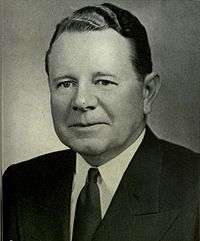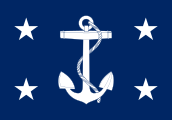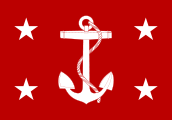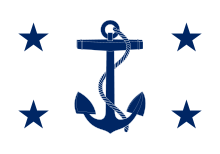John L. Sullivan (United States Navy)

.jpg)
John Lawrence Sullivan (June 16, 1899 – August 8, 1982) was Assistant Secretary of the Navy (AIR) 1946-47 and the first Department of Defense Secretary of the Navy in the Truman Administration 1947-49. He was appointed to that position upon Secretary Forrestal's installation as the first Secretary of Defense. He resigned in protest after the second Secretary of Defense, Louis A. Johnson, canceled the heavy aircraft carrier United States. This event was part of an interservice conflict known as the Revolt of the Admirals.
Sullivan's major contributions to the Navy's future directions include the advent of naval nuclear propulsion. In 1947, then-Captain Hyman G. Rickover went around his chain-of-command and directly to the Chief of Naval Operations, Fleet Admiral Chester Nimitz, by chance also a former submariner, to pitch his ideas for creating a nuclear-powered warship. Nimitz immediately understood the potential of nuclear propulsion and recommended the project to Sullivan, whose endorsement to build the world's first nuclear-powered vessel, USS Nautilus (SSN-571), later caused Rickover to state that Sullivan was "the true father of the Nuclear Navy."[1][2]
Biography
Born in Manchester, New Hampshire, he was an alumnus of Dartmouth College.[3] He died on August 8, 1982.
A biographical book entitled A Different Time, A Different Man written by Stephen Clarkson (published 2012) chronicles the life of Sullivan.[2][4]
References
- ↑ LIFE magazine, September 8, 1958, page 108
- 1 2 Abstract
- ↑ "John L. Sullivan Papers". Truman Library. Retrieved 2007-08-20.
- ↑ ISBN 978-1931807982, Contents
External links
| Wikimedia Commons has media related to John L. Sullivan (United States Navy). |
| Government offices | ||
|---|---|---|
| Preceded by Artemus Gates |
Assistant Secretary of the Navy (AIR) July 5, 1945 – June 17, 1946 |
Succeeded by John N. Brown |
| Preceded by Artemus Gates |
Under Secretary of the Navy June 17, 1946 – September 18, 1947 |
Succeeded by W. John Kenney |
| Preceded by James V. Forrestal (cabinet) |
United States Secretary of the Navy (DoD) September 18, 1947 – May 24, 1949 |
Succeeded by Francis P. Matthews |


